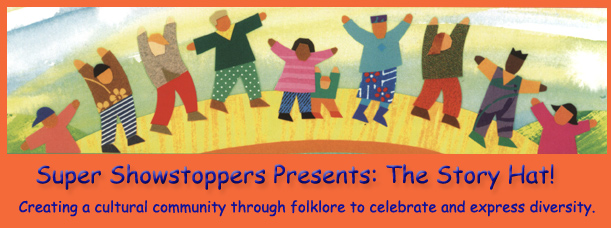
|
Storytelling is an
act of
love.
Njoki McElroy, teacher and
storyteller
|
|
|
The Challenge: 35% of children in
the United States enter public schools with such low levels of the skills and
motivation that are needed as starting points in our current educational
system that they are at substantial risk for early academic difficulties. The
relationship between the skills with which children enter school and their
later academic performance is strikingly stable. For instance, research has
shown that there is nearly a 90% probability that a child will remain a poor
reader at the end of the fourth grade if the child is a poor reader at the
end of the first grade. The Carnegie
Foundation report, Ready to Learn, A Mandate for the Nation, 1991 * No skill is more
critical to the future of a child, or to the future of a democratic society
than literacy. Unfortunately, California student reading scores rank among
the lowest in the nation. In Southern California 4 out of 5 third graders
cannot read at grade level. 70% of the students have limited English
proficiency. John P. Perner , Publisher and Chief
Executive Officer , The Los Angeles Times. Launched Reading by 9 in 1998. * * * * The Solution: The
Hispanic, Native American , African American, Irish American, and many other
cultures in the United States have long histories of storytelling. Teachers
can learn from these cultural traditions of storytelling and providing an
important home-school link. The child who is
consistently exposed to an oral tradition of stories gains skills that
prepare him/her for reading. Some of the most important skills
children gain are: Concept of story Storytelling and the
Emergent Reader
The emotional
connection which storytellers make with children seems to help them maintain
focus and remember details even after a long period of time has elapsed. Areas of impact may
include but are not limited to the following: motivation to read and/or
write; the ability to remember a story and retell it clearly and
articulately; the growth of self esteem through
storytelling;
the ability to visualize and either describe or draw what is in the
imagination; the ability to discuss issues raised in a story and relate them
to ones own life and the world. Princeton Education Profiles * A final and integral
area of impact of story telling is the enhanced vocabulary, intonation,
elaboration, and use of voice that was recorded in this research. Enhancing The Kindergarten Language
Experience Using Storytelling Props * Stories can enhance
intercultural understanding and communication and: allow children to
explore their own cultural roots allow children to
experience diverse cultures enable children to empathize
with unfamiliar people/places/situations offer insights into
different traditions and values help children
understand how wisdom is common to all peoples/all cultures offer insights into
universal life experiences help children
consider new ideas reveal differences
and commonalties of cultures around the world. From: "Storytelling Benefits
and Tips" * Storytelling also
contributes in important ways to literacy . . . one area
reading researchers agree on is that oral-language competencies are essential
in literacy development. Storytelling requires listening and
visualization-key oral-language and comprehension competencies and
strategies. It also provides vocabulary development, in context. Talking with
children and encouraging talk among children is another facet of
oral-language; storytelling stimulates both. From Jane Gangi, Encountering
Children's Literature: An Arts Approach. * Listening to stories
build vocabulary; enhance memory, imagination, and listening skills; help
children think in more complex, abstract, and creative ways; broaden thier
range of experience; and help children develop phonemic awareness through
rhythm and rhyme. Sharing stories with very young children . . . lays the
foundation for a lifelong love of reading." (Barclay, Benelli, & Curtis,
1995; Gottschall, 1995). From Thirteen
Core Understandings About Learning to Read, Northwest
Regional Educational Laboratory (Language & Literacy Team)
One parent in my
class comments, "Anna (pseudonym) often recalls
verbatim,
'Once
upon a time...'
or she will remember the inflection of the teacher's voice and attempt to
imitate it.... although Anna is an emergent reader, her oral
language/retellings are more sophisticated than they were in September."
With this example of progress as a goal for all students,
it is undeniable that storytelling… do indeed, enhance the language
experiences
and increase the prior knowledge of culturally diverse and educationally
diversified early childhood students in the areas of motivation to engage
literacy, comprehension of story elements and sequence, and elaborative
language development. Enhancing The Kindergarten Language
Experience Using Storytelling Props * Watson concludes
that participating in communicative events facilitates the acquisition of
competence to succeed in literacy in school. Development of this
communicative competence through immersion in oral language becomes an
important building block for early success in literacy. From S.B. Neuman and D.K. Dickinson,
Editors: * The extent to which
a child's word recognition departed from the level predicted from their
decoding ability correlated with their oral language skills. These findings
suggest that children's oral language proficiency, as well as their
phonological skills, influences the course of reading
development. Nation, K. & Snowling, M.J.
(2004). * Children's ability
to mark the significance of narrated events through the use of evaluation at
age 5 predicted reading comprehension skills at age 8. Children's ability to
represent informational content in expository talk at age 5 also predicted
reading comprehension at age 8. Control of discourse macrostructures in both
narrative and expository talk at age 5 was associated with written narrative
skills at age 8. Griffin, T.M., Hemphill, L., Camp,
L. & Palmer Wolf, D. (2004).
Storytelling is an
essential, perhaps the essential activity of human beings. It serves a myriad
of functions for the young child. Stories allow children to learn about their
culture, but also serve as a kind of passport into the culture. From
the Northwest Regional Education Laboratory Language & Literacy Team * * * * |
|
|
|
Copyright 2016 by Showstoppers. All rights reserved. |
|